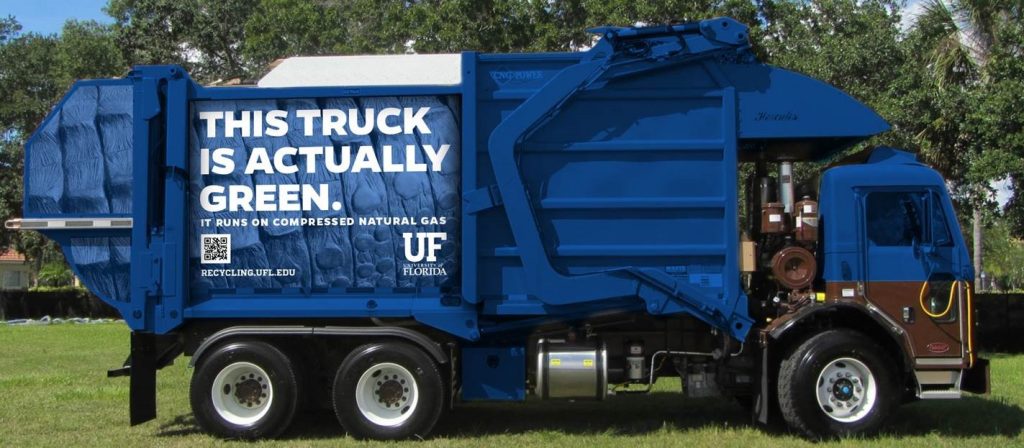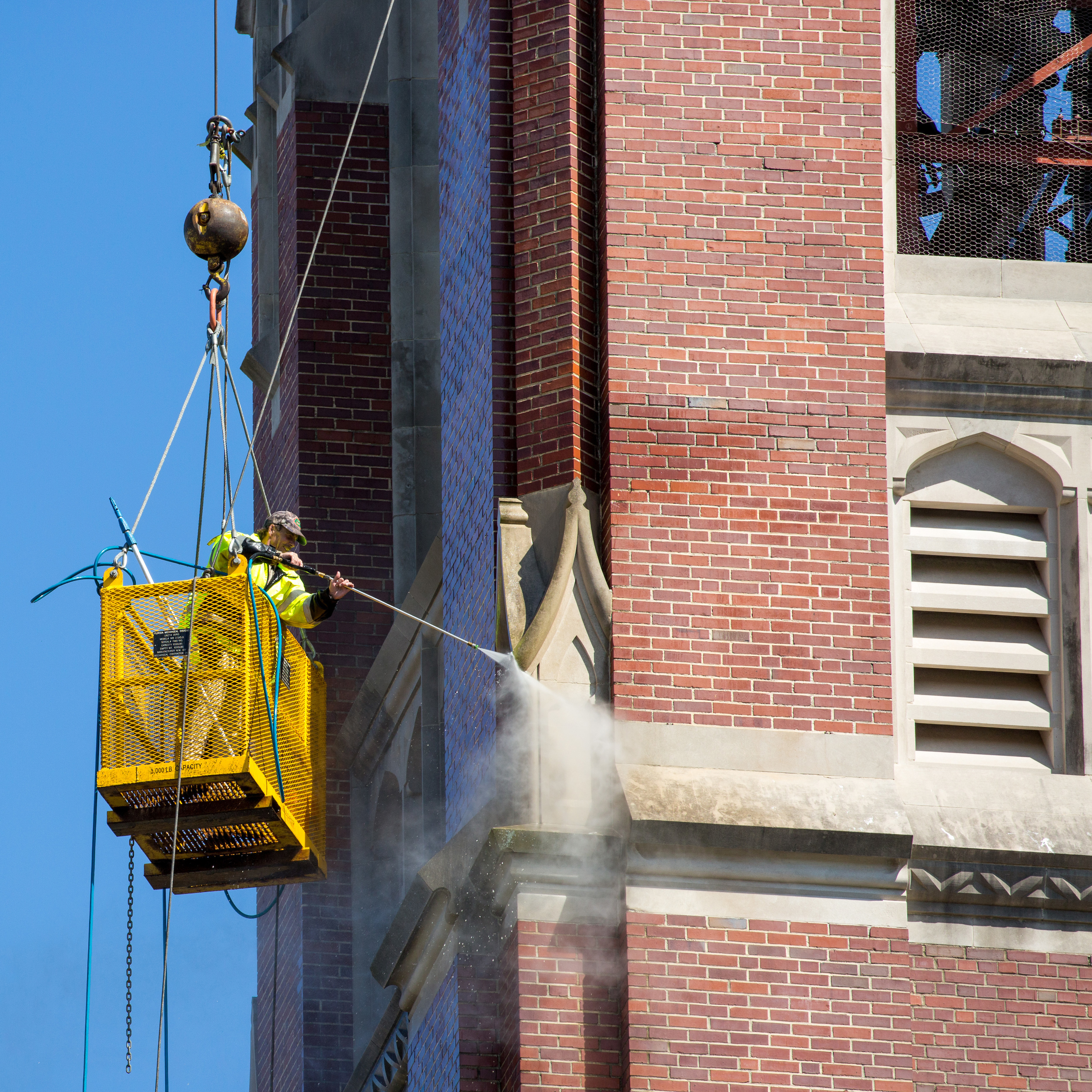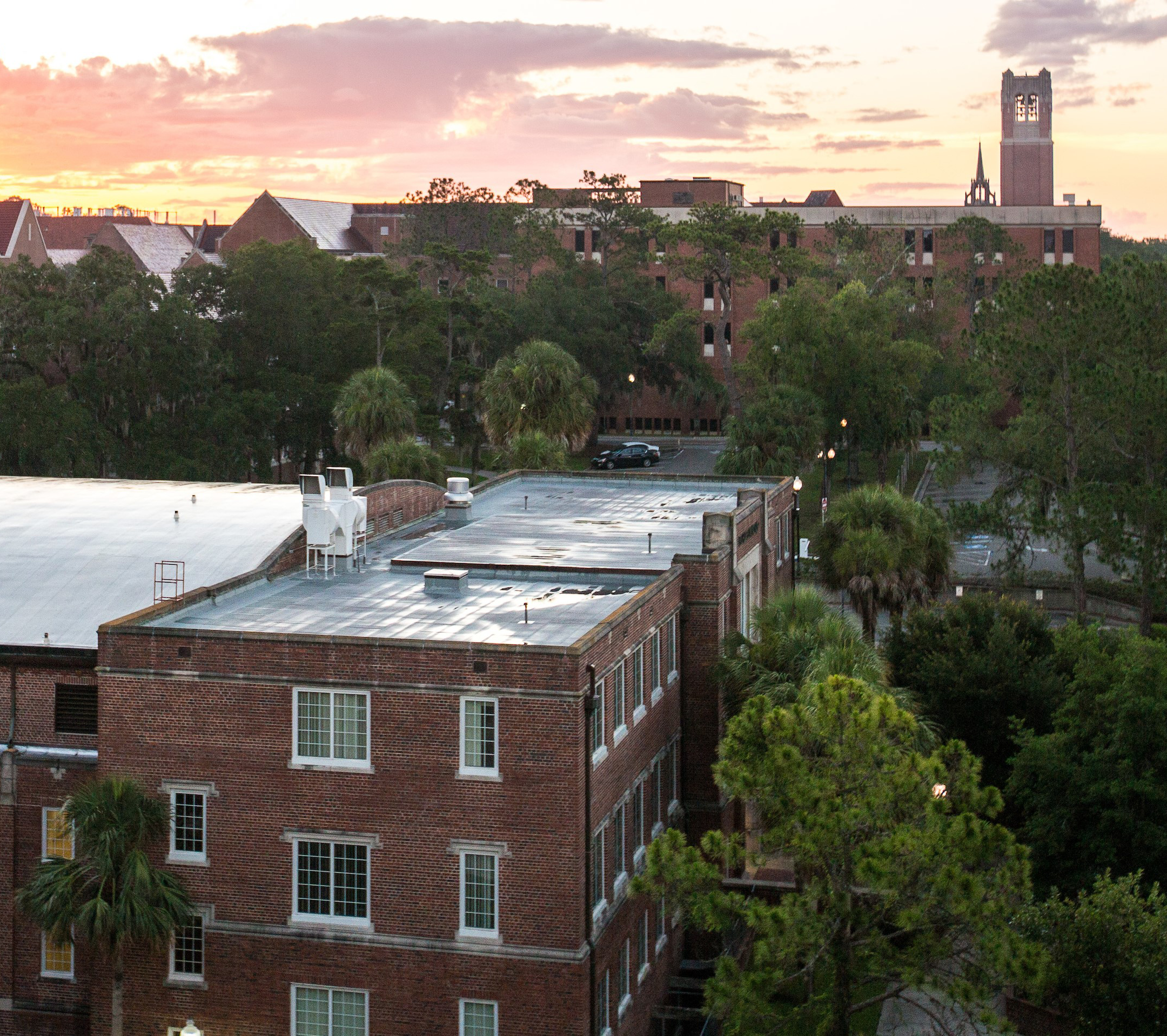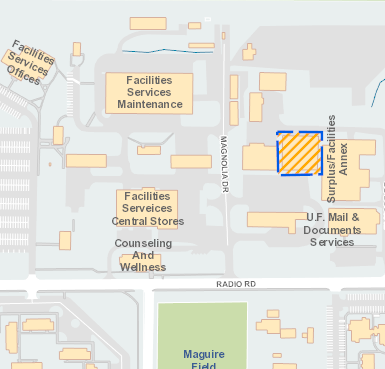- Homepage
- Information
- Sustainability
Sustainability

Dedicated To Sustainability
Facilities Services is dedicated to operating sustainably throughout the University of Florida’s campus. To make UF more sustainable now and for future generations, our sustainability initiatives include:
Energy Services Sustainability Initiatives
- LED lighting – A program to upgrade existing lamps to LED lamps across campus has begun with excellent results. Depending on the type of light source being upgraded we have seen reductions in energy usage from 35% – 55%. We have over 500,000 lamps to upgrade, and we have upgraded an estimated 25,000 lamps (1.7%)
- Laboratory air reduction program – In 2016, a program was created called Laboratory Air Reduction which upgrades research building’s ventilation equipment to allow variable air volume on the supply and exhaust air. By adding occupancy sensors to the existing Building Automation System and changing the amount of air changes per hour that is permissible by Environmental Health and Safety guidelines we can save on the amount of air that is conditioned and then exhausted through the roof. This saves approximately 20% in energy consumption.
- Retro-commissioning – Another program that has been successful is called Retro-Commissioning. Many of our older building’s operational systems need to be updated to allow energy savings sequence of operations. Most of the newer building have these sequences and therefore they typically use less energy. Energy reductions from 10% – 40% have been seen using this process and will continue until all buildings have been updated. Energy Services estimate that all campus building systems should be able to be upgraded by 2030.
- Utilizing a variety of initiatives, the 2019 – 2020 reduction in campus energy consumption per square foot was 12.46%, and the reduction in campus energy cost per square foot was 26.51%.
Building Services Sustainability Initiatives
- Building Services current sustainability initiatives continue to include a focus on green purchasing where available and reasonable as well as the paper towel composting program.
Grounds Sustainability Initiatives
- Composting Program – All landscape waste generated on campus is composted. The finished compost is used by Grounds and Natural Resources for in-house nursery production and as a soil amendment to improve soil for campus gardens.
- Reuse of woody waste – All wood wasted generated by Facilities Services is collected by a third party for conversion into mulch and compost for retail sale. Facilities Services also allows Asplundh Tree Company to dump their chips on UF property and in turn the chips are used across campus in landscape beds and gardens.
- Recycling of motor oil, filters and belts
- Recycling of concrete – Concrete removed from sidewalks, roadways, and other paved surfaces are collected and recycled by a third party vendor. Facilities Services then purchases the crushed, repurposed concrete as needed for landscape fill for new areas on campus.
- Reuse of nursery containers – all containers are reused in the Grounds department production nursery.
- Reclaiming Water – With the exception of some sports/recreation areas and distal areas, over 98% of the university’s irrigation needs are served by the reclaimed water system, thereby greatly reducing campus use of potable water for that purpose. This water is processed at our on-site wastewater treatment facility. As a reminder, irrigation water is not used for drinking purposes
- Native Landscaping – To significantly reduce irrigation consumption utilizing native plants has been a fundamental landscape practice on campus for a decade. Currently, more butterfly friendly and food producing plants are being planted across campus.
- Maintenance area reduction through turf grass replacement with pollinator meadows (2020), with additional acreage planned for conversion (fall 2021).
- Purchase of an electric mower to begin utilization of electric grounds equipment.
Central Stores Sustainability Initiatives
Beginning in 2012, Facilities Services Supply Chain Management and Warehouse Operations (better known as Central Stores) embarked on a mission to improve its sustainability efforts and outcomes.
- Facility
- The facility itself, a 23,297-square-foot warehouse, built in 1964 as a non-insulated brick building with a flat roof had inefficient lighting and HVAC systems and the building had no automatic control systems. The Central Stores team began to implement every no-cost and low-cost improvement they could identify.
- LED lighting was installed while improvements to HVAC, automated controls and other equipment significantly reduced energy costs while improving the indoor environment.
- Motion sensors were added to all lights in the warehouse.
- Fans were replaced with U.S. Green Building Council LEED-certified fans.
- New roll-up doors were installed to reduce heat.
- Dual-flush toilets were installed in the restroom, along with hands-free sinks with automatic shut-off.
- A common print station replaced four printers, one fax machine and a copier. Documents are scanned and electronically forwarded to accounting, and paper receipts are no longer used.
- In 2013, Central Stores entered the EPA Battle of the Buildings Challenge. It placed #1 in Warehouse in a competition of more than 3,000 buildings to reduce energy and environmental impact. That year, Central Stores reduced energy use by 20 percent.
- In 2014, we cut energy and water costs by an additional 53 percent, followed by another 30 percent in 2015.
- In 2015, the building became EPA Energy Star-Certified with an overall score of 90—the first building to hold that status on UF’s campus.
- Also in 2015, the U.S. Green Building Council (USGBC) Innovation in Green Buildings Award recognized Central Stores as its top warehouse contestant—having reduced its energy use by 16 percent in just six months.
- Later in 2016, photovoltaic panels were installed on the warehouse roof that generate 14 kW energy to offset energy use. Surplus energy is fed back into the campus grid.
- In 2017, Central Stores continued a tradition of being recognized for its sustainability practices when it won the 2017 Sustainability Award given by the University Logistics and Supply Chain Association.
- The warehouse has become a flagship for sustainable operations at the university.
- The facility itself, a 23,297-square-foot warehouse, built in 1964 as a non-insulated brick building with a flat roof had inefficient lighting and HVAC systems and the building had no automatic control systems. The Central Stores team began to implement every no-cost and low-cost improvement they could identify.
- Operations
- Two of three delivery vehicles were replaced with hybrid or electric vehicles.
- An electric forklift reduced fuel costs and eliminated the negative impacts of operating gas-powered vehicles inside the warehouse.
- An electric truck has replaced a gas-powered 16-foot box truck for approximately 90 percent of the daily parts deliveries around campus—significantly reducing air pollution and fossil fuel use.
- Rechargeable battery charging stations are available so all Facilities Services operations and maintenance staff can replace dead batteries from power tools with fully charged ones, at no cost.
- More than 60 percent of the building cleaning supplies purchased by Central Stores for campus-wide use are “green products,” including Green Seal Certified, 100% recycled content hand towels and toilet tissue, microfiber dusters, and peroxide based germicide.
- The warehouse is the campus-wide receiving facility for the recycling of used batteries, ink cartridges, and pallets.
- Until recently, Central Stores also received and consolidated used carpet, plastic film, laboratory and other non-bottle rigid plastics for recycling. However, changes in global recycling markets from 2019 to present have forced us to gradually discontinue each of those programs due to a lack of markets for the materials. We plan to bring these programs back, if and when market conditions allow.
Recycling and Solid Waste Management Sustainability Initiatives
Facilities Services Recycling and Solid Waste Management (RSWM) is a leader in sustainability in the areas of reuse, recycling, and composting. In FY 19-20, we achieved a university-wide recycling rate of 55%. This reflects all disposals, including construction project waste associated with all UF Planning Design & Construction (PD&C) major projects. This signifies an 3% increase in the overall recycling rate as compared to the prior year.
In 2016, UF RSWM won the Recycle Florida Today Environmental Sustainability Award in recognition of our innovative food waste and paper towel composting programs that divert approximately 50 tons of organic wastes per month.
In 2017, UF was selected by the National Recycling Coalition (NRC) as its inaugural Outstanding Higher Education Program award recipient. This award was created to recognize colleges and universities with exceptional programs in recycling and in connecting higher education and the recycling industry in the areas of degrees, technology transfer, and career services.
In 2018, UF RSWM was awarded the Recycle Florida Today Environmental Sustainability Award for Environmental Steward of the Year.
The University continues to be a leader in the state in terms of innovative and effective reuse, recycling, and composting programs. Some of those programs include:
- Robust recycling infrastructure for paper, cardboard, and bottles and cans provided across campus.
- Approximately 1,110 outdoor trash and recycling bins across campus, with no stand-alone trash cans.
- 71 solar-compacting Big Belly waste and recycling stations located in areas with the highest levels of waste generation.
- 642 indoor office paper bins provided across 182 buildings and serviced weekly.
- 134 permanent cardboard/paper recycling dumpsters located throughout campus.
- Paper towel composting program in most UF Education and General (E&G) buildings and in certain UF Housing locations.
- Pre-consumer food waste composting in all Gator Dining locations, PK Yonge, UF Health Shands, Krishna Lunch, and participating on-campus Greek houses.
- Post-consumer composting programs at the O’Connell Center and the #GatorsBeatWaste Station in the Reitz Union.
- Provide recycling and composting services to on-campus events.
- Provide five permanent textile recycling locations in UF Housing and Greek housing areas in partnership with Habitat for Humanity.
- Collection and recycling of pallets from all campus buildings.
- Paper recycling carts provided on request to any UF buildings for office paper clean-outs.
- Collection and recycling of wood waste, scrap metal, and masonry at the UF recycling yard.
- Coordinate with Facilities Services Grounds Department annually to compost and screen a combination of street sweepings, greenhouse wastes, and landscaping green wastes into a useful soil amendment that is used to enhance the health and appearance of UF Grounds projects and Rec Sports fields.
- Half of our front-load collection fleet is now fueled by Compressed Natural Gas (CNG).
Over the last few years, we have continued to increase the percentage of waste diverted from disposal despite facing extremely challenging recycling markets both domestically and globally. During FY 19-20, we were forced to discontinue both our carpet recycling program and plastic film recycling program due to a current lack of markets for those materials. In FY 20-21, our program for recycling certain high volume, non-bottle rigid plastics suffered the same fate due to a lack of markets. However, we continue to increase our overall diversion through gains in woody waste, pallet, and concrete recycling as well as through a variety of reuse programs. We continue to seek out new markets and opportunities to expand and/or restore our recycling programs.
Some future goals include the following initiatives to help continue to move toward our goal of diverting 75% of campus waste from the landfill:
- Continue to expand post-consumer composting in targeted locations that have the greatest opportunity for success.
- Continue to expand the paper towel composting program to additional buildings and on-campus Housing location.
- Improve tracking of waste from campus construction and renovation projects.
- Increased participation and reduced contamination through enhanced education and partnerships.
- Interested in more sustainability initiatives on Campus?
- Please visit UF’s Office of Sustainability.
- Have a sustainability idea?
- Please visit our Green Team page.





